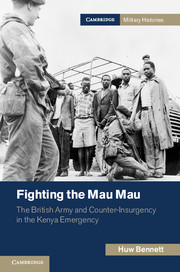Book contents
- Frontmatter
- Contents
- Maps
- Abbreviations
- Acknowledgements
- Introduction
- 1 ‘A determined campaign against the terrorist bands’
- 2 ‘Harmonious relations’: soldiers, civilians and committees
- 3 ‘Possibly restrictive to the operations’: marginalising international law in colonial rebellions
- 4 ‘The degree of force necessary’: British traditions in countering colonial rebellions
- 5 ‘Restraint backed by good discipline’
- 6 ‘A dead man cannot talk’: the need for restraint
- 7 ‘A lot of indiscriminate shooting’: military repression before Erskine's arrival
- 8 ‘Severe repressive measures’: the army under Erskine
- 9 ‘An essential part of the campaign’: civil-military alliances
- Conclusion
- Bibliography
- Index
3 - ‘Possibly restrictive to the operations’: marginalising international law in colonial rebellions
Published online by Cambridge University Press: 05 December 2012
- Frontmatter
- Contents
- Maps
- Abbreviations
- Acknowledgements
- Introduction
- 1 ‘A determined campaign against the terrorist bands’
- 2 ‘Harmonious relations’: soldiers, civilians and committees
- 3 ‘Possibly restrictive to the operations’: marginalising international law in colonial rebellions
- 4 ‘The degree of force necessary’: British traditions in countering colonial rebellions
- 5 ‘Restraint backed by good discipline’
- 6 ‘A dead man cannot talk’: the need for restraint
- 7 ‘A lot of indiscriminate shooting’: military repression before Erskine's arrival
- 8 ‘Severe repressive measures’: the army under Erskine
- 9 ‘An essential part of the campaign’: civil-military alliances
- Conclusion
- Bibliography
- Index
Summary
British counter-insurgency is often claimed to be special because it operates within a legal framework. Yet in Kenya the security forces perpetrated remarkably intense violence. Their actions have been condemned for violating the 1951 European Convention on Human Rights, the 1948 Universal Declaration of Human Rights, the 1930 Forced Labour Convention and the 1949 Geneva Conventions. How can these antithetical ideas be reconciled? This chapter steps back from events in Kenya to show how the British approach to international and military law shaped the reaction to colonial rebellions. Besides the unique characteristics of the Kenya Emergency, we must understand the wider conditioning official mentality which shaped policy on the ground. Widespread mistreatment of the civilian population was legitimated via a complex legal regime. The British created a permissive legal environment conducive to atrocity behaviour which none the less contained elements of restraint strong enough to forestall genocidal practices. Law was indeed central to British counter-insurgency, but not in the way normally understood.
This chapter explains how the United Kingdom approached international law after the Second World War. The structure of that part of international law concerned with war changed dramatically. Because the Zeitgeist on these issues is so different today from in the 1950s there is a compelling reason to establish how far the British government and British Army adapted to these changes. In the 1940s and 1950s new ideas in international law about obedience to authority and extending protections into civil conflicts were not received sympathetically. The British government and British Army adopted a conservative attitude, and even awareness about existing provisions was patchy. These attitudes reflected systematic weaknesses in the international legal regime itself. Arguably British conservatism was far from atypical. Three structural contradictions in international law undermined universal protections, and proved a problem for the British in practice. These were, first, the conflict between the military need for reflexive obedience and the legal requirement to refuse illegal orders; second, the conflict between military necessity and legal restraint; and third, the overly narrow codification which produced different rules for fighting non-Western opponents. Part of the reason why atrocities happened in the Empire was because they were not construed as crimes against international law.
- Type
- Chapter
- Information
- Fighting the Mau MauThe British Army and Counter-Insurgency in the Kenya Emergency, pp. 60 - 82Publisher: Cambridge University PressPrint publication year: 2012



